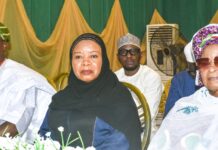A veteran journalist and former Minister of Sports and Youth Development, Mallam Bolaji Abdullahi, has canvassed a framework he called “Participatory Media Accountability System” to make the mass media in the country accountable to the people, saying it is this public-driven mechanism for the regulation of media operations that can ensure the indivisibility and corporate existence of Nigeria.
Mallam Abdullahi canvassed this position last last Tuesday while presenting a paper at the 12th anniversary celebration of UNILORIN 89.3 FM, the official radio station of the nation’s most sought-after University.
The former Minister, whose paper was entitled “Covering Diversity: Mass Media and National Unity”, said that the media is too pervasive, powerful, influential and important to be left to operate in accordance with its whim and caprices without any form of effective regulation, which would make it and its operators more accountable for what they push out for consumption.
Mallam Abdullahi said that the issue of press freedom as being canvassed by the media and the insistence of the government that the freedom should not be absolute is a debate with a very long history across climes. He explained that the contestation is a struggle for power and that the two contending institutions would continue to show contradictions in order to control the perceptions and actions of the consumers of the media products but for different reasons.
The Guest Speaker, who is also a former Commissioner for Education in Kwara State, criticised the media for disregarding what he called “the reality of wanton abuse of media power, which equally constitutes real danger to the nation’s corporate existence in their cry against the attempt of the government to regulate media practice”.
While alluding to the fact that “democracy thrives only when the people have access to correct information about matters that affect them and are able to use this knowledge to make informed choices and take decisions about their lives”, the renowned media technocrat shared the sentiments of policy makers that “the men and women that operate the media do not always serve the public interest”.
Although he noted that “government’s involvement in exercising some measure of control have always met with virulent resistance by the media” because of the conviction that the attempts were targeted at muzzling the press, Mallam Abdullahi explained that “the most conservative libertarians have come to agree that the press can do with some restraining”.
He described such tendencies as presumptuous, if not downright hypocritical on the side of the media as he expressed the conviction that the call for media regulation is not akin to an attack on democracy and Nigeria’s democratic survival as viewed by media operators.
Mallam Abdullahi said that the worry of the government over the quality of contents being circulated on both the conventional and social media is justifiable going by the persistent spread of fake news capable of throwing the country into unimaginable crises. He, however, said that the move of the government towards that direction through legislation is a demonstration of naivety and lack of appreciation of historical occurrences which do not favour the adoption of such a despised method.
On the best way of regulating the media, Mallam Abdullahi said that the media has not shown anything to show that it can self regulate, saying that the way and manner members of the press ignored the code of ethics of their profession does not give room for that assurance.
While saying that the media is right to be suspicious of government’s intentions, the distinguished media technocrat said that the media must demonstrate a stronger interest in accountability, which has been made complex and more necessary following the advent of the social media.
Mallam Abdullahi insisted that to put the situation under control, citizens should be afforded more education. He contended that the more educated the citizens are, the more exposed they become and the more conscious they are of their rights and responsibilities.
The former Minister added that the more educated a nation’s population is, the more unwilling they would make themselves available as vendors of fake news or purveyors of hate, expressing the conviction that media outlets which publishes fake and untrue information would eventually run out of business as no educated person would patronise them.
Welcoming participants to the programme, the Chairman, UNILORIN FM Board, Prof. Jeleel Ojuade, described the station as a pride to the University and its increasing listeners.
The renowned scholar of the Performing Arts thanked all the guests for honouring the invitation of the University and the station as shown in the large turnout of people who came from far and near to be part of the event.
Prof. Ojuade said that, while contributing to national development in several ways, the station has significantly contributed to the reduction of tension on the University campus through its peace-building programming and jingles, which also has great effects on its listeners beyond the shores of the University.
The Chairman, who said that the anniversary celebration was to assess the contributions of the station and draw attention to its challenges, called for more support for the station by the University administration and members of the public for it to continue to excel.
In his goodwill message, the Governor of Kwara State, Mallam AbdulRahman AbdulRazaq, commended the station for its generous contributions to the development of the state.
Governor AbdulRazaq, who was represented by his Special Adviser on Political Communication, Alhaji Bashir Adigun, assured the University and the station of the support of the government and people of Kwara State.
The highlight of the programme was the presentation of awards to deserving individuals including the Wife of the Governor of Kwara State, Ambassador Olufolake AbdulRazaq, who was represented by the Kwara State Commissioner for Information and Communication, Hon. Olaitan Abisede Buraimo.
The event also witnessed the investiture of the Director of Corporate Affairs, University of Ilorin, Mr. Kunle Akogun and the Station Manager, UNILORIN FM, Mr. Idris Akintola Ibrahim (Idris Alooma) as Fellows of the Fourth Estate Professional Society (FEPS) by the President of FEPS, Dr. Babatunde Salami.






